
Say the word “menopause” and you might create extreme fear. Night sweats, hot flashes, mood swings, and even depression are all symptoms of this very common, and generally inevitable, issue. Menopause affects most women over the age of 50, and is more clearly defined once a woman has stopped menstruating for at least one year. Along with the loss of menstruation comes a decline of hormones—specifically, estrogen and progesterone, as Dr. Andrew Weil notes here. Some women experience similar symptoms during perimenopause, which generally occurs a decade earlier, but for the purposes of this article, we’ll focus on menopause.
Unfortunately, what we think of as the time for menopause may last far longer than we’re comfortable with. In fact, a recent study conducted at the Mayo Clinic suggested that a large number of women experience menopausal symptoms, like hot flashes, well into their 60s, 70s, and even 80s.
This can be tremendously frightening news if you’re a woman just approaching menopause now. How can you live through several decades of uncomfortable heat, sweat, and general discomfort? While it may be tempting to try pharmaceuticals, many come with extremely unpleasant side effects that are often worse than the original issue. Luckily, plant medicine is generally much safer and oftentimes just as, if not more, effective than its chemical counterpart. Struggling to get through menopause? Try these natural alternatives to learn that there is, in fact, hope through menopause.
Perspective
Believe it or not, how you approach menopause can help or hinder some of the symptoms you experience. Seeing it as the loss of fertility and youthfulness can make it harder to cope with your changing body. Dr. Weil explains, “If menopause is seen as simply the natural transition to the next phase of life, it can be readily accepted and more easily handled.”
Phytoestrogens
Phytoestrogens are plant-based estrogen that are readily available in soy foods. A high consumption of soy foods can have a negative effect on premenopausal women because of their tendency to add too much estrogen to the body; in turn, this can increase the risk for polycystic ovarian syndrome among other issues, as this article explains. Fortunately, phytoestrogens may be able to reduce the risk of certain cancers in menopausal women. Until further research comes out, look to less-processed soy foods like tempeh, tofu, and edamame. Go organic to avoid genetically modified soy foods and aim to enjoy some 2-3 times each week.
Black Cohosh
Black cohosh is a member of the buttercup family, but looks more like a grain-based plant with a long flowering stem dotted with round, white flowers. Black cohosh was used with widespread frequency by Native Americans, who introduced it to Europeans. Since then, it is often used as a treatment for anxiety, rheumatism, sore throat, and, more importantly for this article’s purposes, menopausal symptoms. A 2004 study demonstrated that black cohosh had positive effects on menopausal systems without creating estrogen-like effects in the body. For exact dosages, consult your natural health practitioner.
Evening Primrose Oil
Evening primrose oil is great externally (it’s often used as a treatment for eczema) and it’s proving to be just as positive internally, too. Evening primrose is a sunny plant with bright yellow flowers. Native to North America, evening primrose oil, generally taken in capsule form, is most often used as a way to reduce hot flashes in menopausal women. A 2013 study demonstrated a decrease in intensity of hot flash attacks while a more recent 2018 study compared black cohosh to evening primrose oil in its ability to reduce hot flashes. While evening primrose oil worked well, black cohosh seemed to better reduce menopausal symptoms. Still, it’s worth trying evening primrose oil for hot flashes, too.
Chasteberry
Chasteberry, also known as vitex, is fantastic at reducing PMS symptoms. Luckily, it works well to also reduce side effects of menopause, too. A 2009 study concluded that vitex can aid in reducing menopausal symptoms, while an earlier 2002 study demonstrated that vitex as an essential oil may be even more effective. To start, consult with your health care practitioner about the ideal dosage for your symptoms.
B-Vitamins
B-vitamins are often lacking for those of us who eat a diet with fish and meat, and a lack of vitamins like B12 are an even bigger problem for those who are vegan and vegetarian. Along with helping us convert the food we eat into energy we can use, B-vitamins can also help to reduce stress, and thus may be useful for those struggling with menopause. A simple B-complex can be beneficial, but look to get in good amounts of eggs, fish, and poultry or, if vegan, nutritional yeast or soy foods.
Have you experienced menopausal symptoms? What do you do to cope? Let us know in the comments below!








